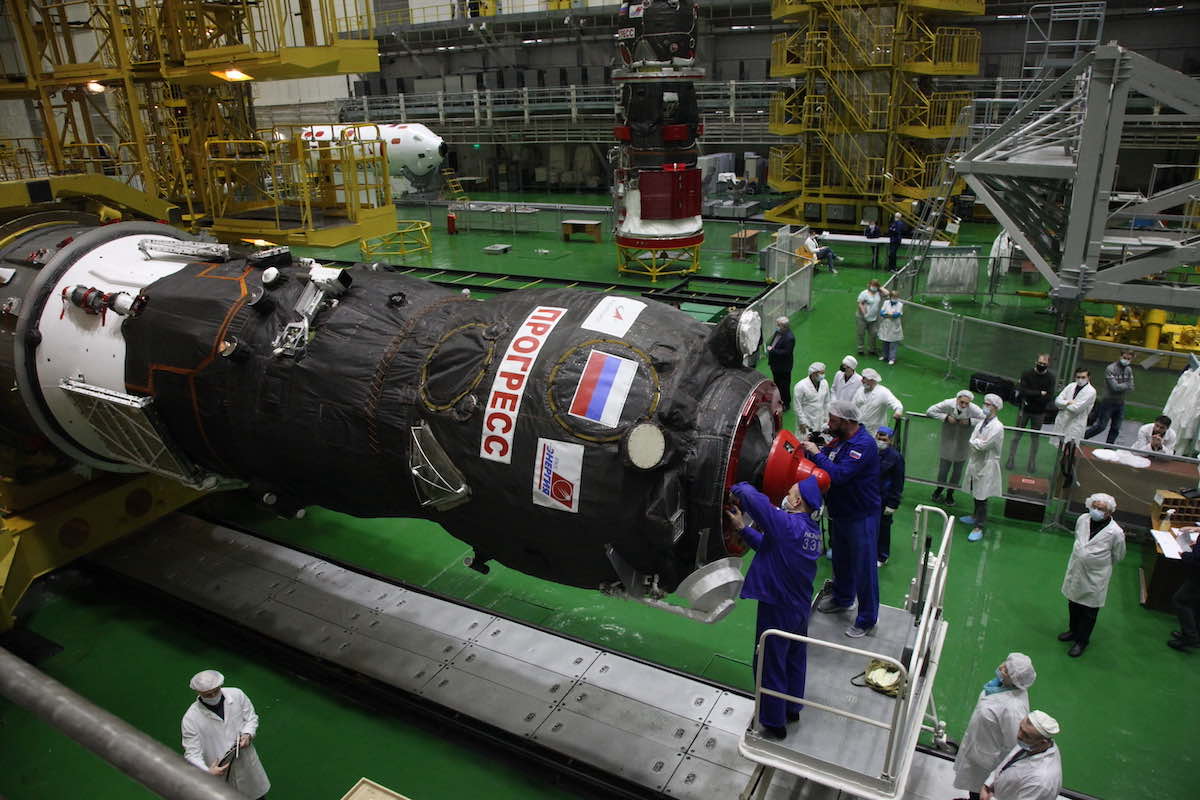Russia’s Progress MS-19 supply ship is set for launch from Kazakhstan on Monday night aboard a Soyuz rocket to begin a two-day pursuit of the International Space Station with more than 5,500 pounds of fuel, food, water, and experiments.
Liftoff of the Soyuz-2.1a rocket is scheduled for 11:25:40 p.m. EST Monday (0425:40 GMT Tuesday) from the Site 31 launch complex at Baikonur, where launch is set for 9:25 a.m. local time.
The kerosene-fueled rocket will haul the Progress MS-19 cargo freighter into orbit in less than nine minutes. The Soyuz rocket’s four first stage boosters will jettison two minutes into the mission, followed by separation of the vehicle’s aerodynamic nose shroud, and cutoff and release of the core stage at T+plus 4 minutes, 47 seconds.
A third stage engine will finish the task of injecting the Progress MS-19 supply ship into a preliminary orbit nearly nine minutes into the mission. The Progress spacecraft, the 80th Russian resupply ship to head for the ISS, will unfurl solar panels and navigation antennas moments later to configure itself for the chase of the international research lab.
A series of thruster burns will culminate in a radar-guided automated docking of the unpiloted cargo carrier to the station’s upward-facing Poisk compartment at 2:06 a.m. EST (0706 GMT) Thursday. It will remain there for more than a year.
The mission launching Sunday will mark the first flight to the space station this year, and the third launch of a Russian Soyuz rocket to start 2022.

Russian ground teams at Baikonur rolled the Soyuz rocket to its launch pad Saturday on a horizontal rail car. Hydraulic lifts raised the 15-story rocket vertical, and gantry arms swung into position around the Soyuz to give technicians access to the vehicle for final pre-flight preparations.
Russian officials met a few hours before liftoff and gave approval for ground teams to load kerosene and liquid oxygen propellants into the Soyuz rocket. An automated countdown sequencer will send commands for pressurization of the launcher in the final minutes before liftoff.
The launch is timed for the moment Earth’s rotation brings the Baikonur Cosmodrome under the International Space Station’s orbital track.
Roscosmos, Russia’s space agency, said the Progress MS-19 spacecraft will deliver around 5,562 pounds (2,523 kilograms) of supplies to the station.
Russian ground teams loaded 3,598 pounds (1,632 kilograms) of dry cargo into the Progress freighter’s pressurized compartment, according to Roscosmos. The space agency said the mission carries 950 pounds (431 kilograms) of propellant to refuel the station’s Zvezda module propulsion system, 926 pounds (420 kilograms) of fresh drinking water, and 88 pounds (40 kilograms) of compressed gas to replenish the space station’s breathing air.

The equipment the Progress mission is ferrying to the space station includes six Russian student-built CubeSats, which will be deployed outside the outpost by Russian cosmonauts on a future spacewalk. The Progress MS-19 supply ship will also deliver kits for an experiment studying how long-duration spaceflight affects the work of cosmonauts, and cargo for research investigations probing the effects of bacteria on spacecraft structures.
There are also items aboard the Progress MS-19 mission for a plant and microbiology experiments, and equipment to support the production of pharmaceuticals in microgravity.
Russia’s Progress MS-19 supply ship is the first of two unpiloted cargo freighters heading to the International Space Station in the next week.
NASA and Northrop Grumman teams in Virginia are preparing for launch of a Cygnus cargo ship Saturday on a commercial Antares rocket. If that launch occurs on time, the Cygnus spacecraft is scheduled to arrive at the station next Monday, Feb. 21.
Email the author.
Follow Stephen Clark on Twitter: @StephenClark1.
from Spaceflight Now https://ift.tt/gLhDs8k
via World Space Info







0 comments:
Post a Comment